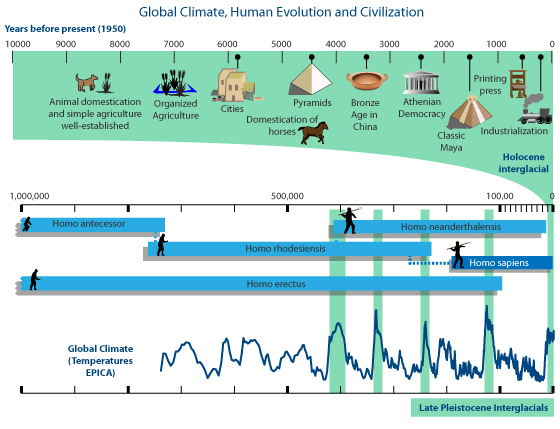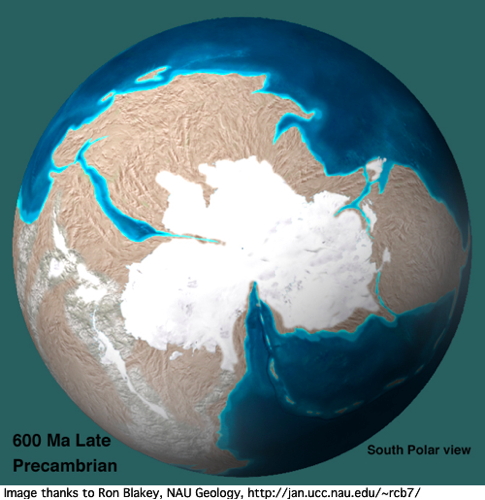How past climate change impacted the human species
What the science says...
Humans have been through climate changes before- but mostly cold ones and mostly in our far distant past.
Climate Myth...
Humans survived past climate changes
"Yes, our climates change. They've been changing ever since the earth was formed." (Rick Perry)
Previous major global climate changes were glacial cycles that happened long before human civilization developed.
The human species evolved during the last 2.5 million years. Our far distant ancestors survived through multiple gradual cycles of cold ice ages, but did not experience any previous "hot ages."
We homo sapiens in our current form appeared only about 200,000 years ago. So our species has survived two ice ages. In each ice age global temperatures were colder by 4 °C. The warmest period ever experienced by early humans was about 1 °C warmer (global average) than today. That period occured between the two most recent ice ages, 120,000 years ago (Eemian). Over the next 100,000 years temperatures gradually decreased into a new ice age. During that colder period humans began to expand out of Africa and across the globe. Ever since the Eemian much cooler temperatures have been the norm.

Image by John Garrett.
Human civilization is roughly 12,000 years old, as defined by the start of permanent settlements and agriculture. Agriculture became established as the glaciers retreated from the last ice age. Modern society has developed entirely in our current geological epoch, the Holocene. Global temperatures haven't varied by more than ±1 °C since. There have been regional shifts in climate (Medieval Warm Period, Little Ice Age, etc), but since civilization began humans have never experienced a hotter global climate than now.
Going back further, over a million years or so, our pre-human predecessors experienced a series of long cold glacial cycles. Several short interglacial periods were as warm or slightly warmer than our current climate. For example, the climate 400 kyrs ago, was slightly warmer than now. But more typically for the last million years it's been 4 to 8 °C colder. Each transition from warm to glacial ages and back took thousands of years, giving humans and prehumans many generations to adjust.
So, really, the climate hasn't changed much since we settled into towns, invented plumbing, and started calling ourselves civilized.
Since humans and our human ancestors have been on Earth, average global temperatures have never been 3 °C warmer than now. In the next 100 years our children will be the first people ever to experience that kind of climate.
But, perhaps Mr. Perry is thinking he'd like to live in a climate eons ago, closer to when the Earth was formed.

Digging way back in time, we know that Earth's climate has certainly been very different than it is now: 2 billion years ago there was not even any oxygen in the atmosphere. 550 million years ago high CO2 levels caused extreme greenhouse conditions. Humans were not around to care; the most advanced life form at that time was a flatworm. Humans could not physically survive over most of the planet in the age of the dinosaurs (Cretaceous, 100-65 Myr ago). Only very small mammals were beginning to evolve. Global average temperatures were 10-12 °C hotter than today. Most places on land were so hot that humans would risk fatal heat stroke every summer.
The geological record shows many ancient changes in climate, including massive ice ages, hot-house conditions, oxygen-free and acidic oceans, and massive extinction events. These changes happened millions of years before humans, most occurred before even primitive mammals, appeared on the scene. Previous climate changes were caused by orbital wobbles, solar fluctuations, and movement of continents. None of those effects are causing the current heating http://sks.to/past.
Last updated on 9 March 2012 by dana1981. View Archives































 Arguments
Arguments





























It's not the case that we would survive or not, but in the sense that the world would be a much tougher place to live. I am curious about this. Are there any reliable prediction on the things that climate change will change our way of living in the next few decades?
Ping34 , you should read the article [posted on 3 April 2018] titled "Scientists examine threats to food security if we meet the Paris climate targets". Also read the linked article ("how bad will it be") mentioned in the second sentence of the 3 April 2018 article.
Also read "Most Used Climate Myths : Number 3" which is listed in the upper left region of the Home Page. You may read it at the Basic level or Intermediate level or the Advanced level.
In very brief summary — a one or two degree rise (from now) in surface temperature will produce a significant reduction of cereal crops [rice, wheat and maize, and other foods as well]. More heat-waves, droughts, floods, and storms, will reduce the total food production (there are very few food crops which will benefit from the new conditions). Maize is especially damaged by droughts and prolonged heat-waves.
Increased ocean acidity [from CO2] will reduce the supply of fish and other marine foodstuffs. Rising sea level will gradually affect farming in the rich soil of the river deltas.
Less food supply, rising food prices . . . and so more political unrest & instability . . . and increasingly big numbers of "climate refugees" (on top of political refugees) . . . yes, the world will be a tougher place to live in.